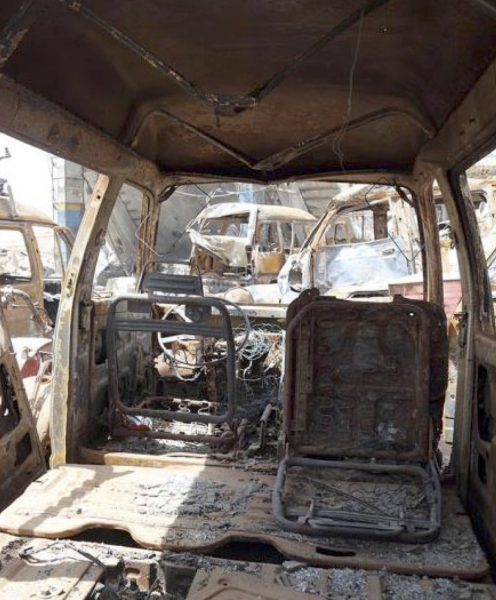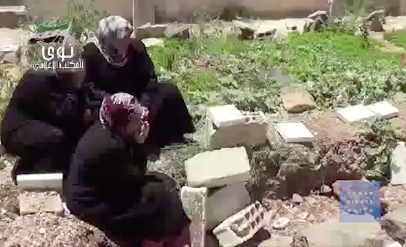On 31 October, as First Committee delegates contemplated their voting instructions, UN Secretary-General Ban Ki-moon and International Committee of the Red Cross (ICRC) President Peter Maurer met in Geneva to issue a stark critique of international efforts to protect civilians. Their six-point call included a demand for states to stop the use of “heavy explosive weapons in populated areas.”
Throughout First Committee, a number of states suggested that they are heeding this call. Led by Austria, which used First Committee to set out both the humanitarian problem and the proposal for a political commitment to help prevent it, a group of committed states is emerging on this issue. Costa Rica, Guatemala, Ireland, Mexico, the Netherlands, and Norway all raised this humanitarian concern during their contributions to First Committee, with Norway doing so at Prime Ministerial level during the high-level opening.

Burned-out cars lined up by the Jarman petrol station, Saada City, Yemen, which was struck in an aerial attack on April 15, 2015. © 2015 Ole Solvang/Human Rights Watch
They are right to do so. The humanitarian emergencies in Iraq, Yemen, Syria, and Ukraine are dire. People are being killed and injured in their homes and as they try to take shelter. Desperate citizens are being bombed out of their towns, fleeing their countries and taking their scars, physical and psychological with them. Their communities are being made unliveable by the bombs and rockets and shells raining upon them. The damage will be severe and long-standing. The reverberating effects set out by the ICRC in its statement and side event presentation are hard to measure, but even harder to ignore. Water and sanitation, electricity, medical care—all these basic services are being disrupted if not destroyed.
In its latest 61-page report on “International humanitarian law and the challenges of contemporary armed conflicts,” the ICRC included a substantive 6-page section on the use of explosive weapons in populated areas. It should be compulsory reading for policy makers in the field of international humanitarian law (IHL), protection of civilians, and weapons law and policy. It strongly sets out the humanitarian and legal concerns associated with the use of explosive weapons in populated areas:
“Based on the effects of explosive weapons in populated areas being witnessed today, there are serious questions regarding how the parties using such weapons are interpreting and applying IHL. Divergent practice of militaries, and contrasting views among experts and in the case law of international criminal tribunals regarding what is or is not legally acceptable, may point to ambiguities in IHL and the need for States to clarify their interpretation of the relevant IHL rules or to develop clearer standards to effectively protect civilians.”
There is no doubt now that a state-led process exists towards an international political commitment to prevent harm from the use of explosive weapons in populated areas. This commitment will be one useful way for states to develop such “clearer standards to effectively protect civilians.” All states concerned with the appalling human suffering of the people living with bombing and shelling should join the effort and seek the strongest possible outcome for the protection of civilians. This should include a call to end the use in populated areas of explosive weapons with wide area effects. States’ next opportunity will be the International Conference of the Red Cross and Red Crescent in Geneva from 8-10 December, where Austria will host a side event on this topic on 9 December. States should take this opportunity to indicate their support for a political commitment to prevent this harm, which is the pressing humanitarian challenge of armed conflict today.

Still from a video produced by Human Rights Watch on the aftermath of a barrel bomb attack © Human Rights Watch
In related First Committee and UN developments, the Afghan-led resolution on improvised explosive devices (IEDs), L.36, was adopted without a vote. In its statement upon adoption, Austria noted that “the problem of IEDs should not be seen in isolation from the broader humanitarian challenge of the use of explosive weapons in populated areas.” Earlier drafts of the resolution had referenced this wider context, but were removed in revised drafts following consultations. Certain states are known to have expressed concern with the discourse on explosive weapons in the past, including the United Kingdom.
The UK is one of the states supporting the French-led initiative for a UN Security Council resolution on the use of barrel bombs. Again, these states are rejecting sensible efforts to recognise the wider impact of the use of explosive weapons in populated areas. These wide area explosive effects are the fundamental problem rather than the improvised nature of the weapons, whether they are IEDs or barrel bombs. A condemnation of the use of these weapons, which is taking place in populated areas, should logically support the development of a political declaration on explosive weapons in populated areas. This focus on barrel bombs would appear either badly misinformed or deliberately aimed at resisting the development of a progressive initiative to enhance the protection of civilians. It should be reversed if the states making them are to have any credibility in relation to the protection of civilians.
This article was first published in Reaching Critical Will’s First Committee Monitor.
